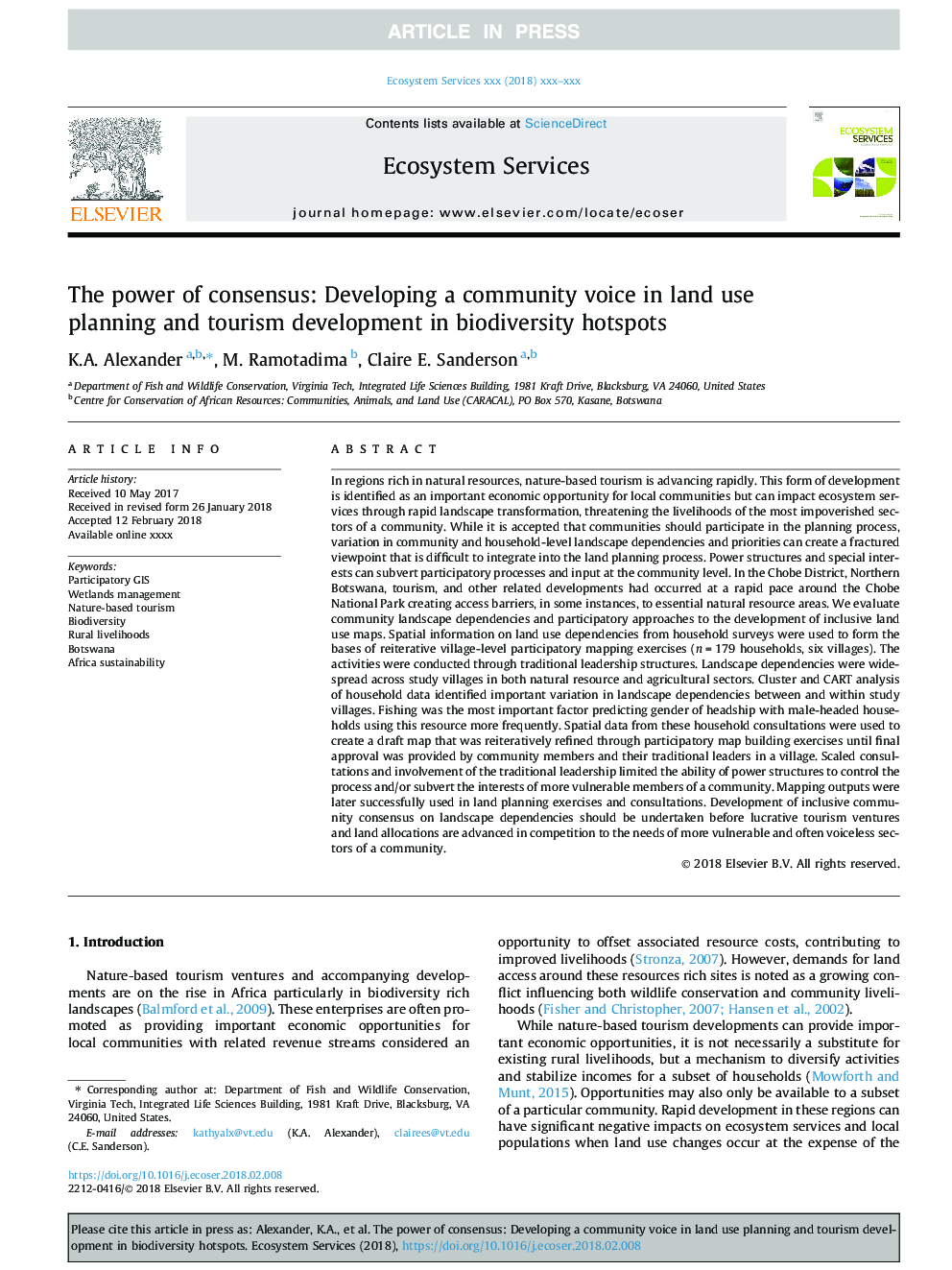| کد مقاله | کد نشریه | سال انتشار | مقاله انگلیسی | نسخه تمام متن |
|---|---|---|---|---|
| 6556330 | 1422525 | 2018 | 12 صفحه PDF | دانلود رایگان |
عنوان انگلیسی مقاله ISI
The power of consensus: Developing a community voice in land use planning and tourism development in biodiversity hotspots
ترجمه فارسی عنوان
قدرت اجماع: ایجاد صدای جامعه در برنامه ریزی استفاده از زمین و توسعه گردشگری در نقاط مختلف تنوع زیستی
دانلود مقاله + سفارش ترجمه
دانلود مقاله ISI انگلیسی
رایگان برای ایرانیان
کلمات کلیدی
موضوعات مرتبط
علوم زیستی و بیوفناوری
علوم کشاورزی و بیولوژیک
علوم کشاورزی و بیولوژیک (عمومی)
چکیده انگلیسی
In regions rich in natural resources, nature-based tourism is advancing rapidly. This form of development is identified as an important economic opportunity for local communities but can impact ecosystem services through rapid landscape transformation, threatening the livelihoods of the most impoverished sectors of a community. While it is accepted that communities should participate in the planning process, variation in community and household-level landscape dependencies and priorities can create a fractured viewpoint that is difficult to integrate into the land planning process. Power structures and special interests can subvert participatory processes and input at the community level. In the Chobe District, Northern Botswana, tourism, and other related developments had occurred at a rapid pace around the Chobe National Park creating access barriers, in some instances, to essential natural resource areas. We evaluate community landscape dependencies and participatory approaches to the development of inclusive land use maps. Spatial information on land use dependencies from household surveys were used to form the bases of reiterative village-level participatory mapping exercises (nâ¯=â¯179 households, six villages). The activities were conducted through traditional leadership structures. Landscape dependencies were widespread across study villages in both natural resource and agricultural sectors. Cluster and CART analysis of household data identified important variation in landscape dependencies between and within study villages. Fishing was the most important factor predicting gender of headship with male-headed households using this resource more frequently. Spatial data from these household consultations were used to create a draft map that was reiteratively refined through participatory map building exercises until final approval was provided by community members and their traditional leaders in a village. Scaled consultations and involvement of the traditional leadership limited the ability of power structures to control the process and/or subvert the interests of more vulnerable members of a community. Mapping outputs were later successfully used in land planning exercises and consultations. Development of inclusive community consensus on landscape dependencies should be undertaken before lucrative tourism ventures and land allocations are advanced in competition to the needs of more vulnerable and often voiceless sectors of a community.
ناشر
Database: Elsevier - ScienceDirect (ساینس دایرکت)
Journal: Ecosystem Services - Volume 30, Part C, April 2018, Pages 350-361
Journal: Ecosystem Services - Volume 30, Part C, April 2018, Pages 350-361
نویسندگان
K.A. Alexander, M. Ramotadima, Claire E. Sanderson,
